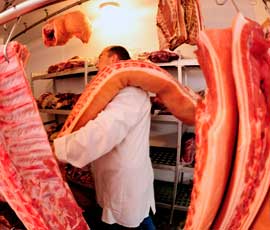Pig Business with Peter Crichton: euro gains boost domestic pig trade

June normally provides a benchmark as far as pig prices are concerned as 2011 reaches its halfway point.
The latest Deadweight Adjusted Pig Price (DAPP) of 153.43p announced on 29 June remained unchanged from a week earlier, but was higher than its value a year ago, when the DAPP stood at 147.31p, which by the end of 2010 had slipped to 137.23p.
However, the relative strength of the euro has a significant influence on UK producer prices by affecting the actual cost of imported pigmeat, which now accounts for over 50% of total UK consumption.
In June 2010, the euro traded at 82.9p compared with 90.3p this week, which effectively puts up the cost of imports by 9%.
Providing recent unrest in some European countries does not lead to a weakening of the euro, this paints a better picture for UK pig prices in the months ahead.
Domestic pig supplies are also tending to tighten, and this was flagged up by a reduction in the average weight of the pigs included in the DAPP sample, which last week had fallen to 77.62kg, indicating that demand slightly exceeds supply.
The results of the June 2011 pig census will also make interesting reading, both as far as the size of the UK pig herd is concerned, as well as estimated numbers of slaughter pigs in the system.
Recent falls in worldwide cereal futures markets should help to improve producers’ returns, or at least cut some of their losses, although this remains a volatile sector, but forward prices for wheat have dropped by almost £20/t from earlier highs.
With the UK harvest almost ready to start, helped by more rain, which has improved growing conditions in the eastern part of the country, producers are hoping that it might be possible to buy wheat at off-the-combine prices of not much more than £150/t.
The weaner market, however, continues to reflect the imbalance between feed and pig prices, and the latest Agriculture and Horticulture Development Board (AHDB) 30kg weaner average of £45.80/head is still up to £5/head below current production costs.
Even if lower cereal prices are maintained in the months ahead, it may be several months before the financial benefits have any significant effect on producers’ cashflows and budgets.
This is why the National Pig Association is continuing with its campaign to persuade the retail sector to increase prices paid to UK pig farmers for their welfare-friendly product, which was highlighted at the demonstration by 70 pig industry demonstrators at the Tesco AGM on 1 July.
